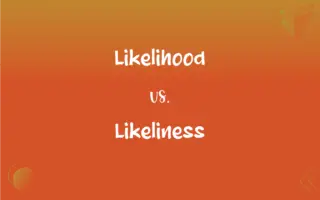Low-Profile vs. Low-Key: What's the Difference?
By Janet White || Published on January 27, 2024
Low-profile refers to deliberately avoiding attention or publicity, while low-key describes a subdued, restrained, or understated manner or style.

Key Differences
Low-profile is used to describe a conscious effort to stay out of the public eye or avoid attracting attention, often in a professional or public context. Low-key, in contrast, refers to a style or approach that is understated, quiet, or restrained, whether by choice or nature.
A low-profile approach is often adopted in situations where discretion or privacy is desired, such as by celebrities or in sensitive professional roles. Low-key, on the other hand, can describe anything from a person's demeanor to the atmosphere of an event, emphasizing a lack of intensity or flamboyance.
In terms of personality, a low-profile individual actively seeks to minimize public attention or exposure. Conversely, a low-key person might naturally have a calm, unobtrusive demeanor without necessarily seeking to avoid attention.
Low-profile often involves a strategic or deliberate choice, especially in terms of public relations or media exposure. Low-key, however, is more about the nature or tone of behavior, actions, or events, without the implication of a strategic motive.
Low-profile is specifically about visibility and public perception, low-key extends to various aspects of life, including attitude, lifestyle, and social interactions, indicating a preference for simplicity and subtlety.
ADVERTISEMENT
Comparison Chart
Primary Focus
Avoiding attention or publicity
Subdued, restrained manner or style
Usage Context
Professional, public visibility
Personal demeanor, event atmospheres
Strategic Element
Often a deliberate choice
Can be natural or a choice
Implication
Desire for privacy or discretion
Preference for simplicity, subtlety
Personality Type
Actively minimizes public exposure
Naturally calm, unobtrusive
ADVERTISEMENT
Low-Profile and Low-Key Definitions
Low-Profile
Minimizing visibility and exposure.
During the controversy, he adopted a low-profile stance.
Low-Key
Subdued or restrained in manner.
The party was a low-key affair.
Low-Profile
Keeping oneself out of the spotlight.
After his retirement, he led a low-profile life.
Low-Key
Understated or modest.
The decorations were low-key but elegant.
Low-Profile
Subtle or discreet in appearance or behavior.
Their low-profile approach to investment has been successful.
Low-Key
Not elaborate, flashy, or intense.
She prefers a low-key style of dressing.
Low-Profile
Intentionally understated presence in public.
The CEO maintains a low-profile outside of work.
Low-Key
Lacking in intensity or flamboyance.
The meeting was low-key, focusing on essential points.
Low-Profile
Avoiding public attention.
She kept a low-profile after the movie's release.
Low-Key
Quiet and unobtrusive.
His low-key personality makes him a great listener.
Low-Profile
Behavior or activity carried out with deliberate restraint or modesty so as not to attract attention
Keep a low profile.
Low-Key
Having low intensity; restrained, as in style or quality; subdued.
Low-Profile
Not clearly attracting attention; inconspicuous
With their low-profile design, these old houses seem to be hiding in the countryside.
Low-Key
Having or producing uniformly dark tones with few areas of contrast, as in a photograph or film.
Low-Key
Dark; characterised by dark tones and muted colours.
Low-Key
(by extension) Restrained, subtle, not trying to attract attention.
She deserves an Oscar for her low-key performance in that movie.
Low-Key
Kind of.
Low-Key
(slang) In a low-key or surreptitious manner; secretively; on the down-low.
Low-Key
Restrained in style or quality; not flashy or intense; understated; as, a little masterpiece of low-keyed eloquence.
Low-Key
Restrained in style or quality;
A little masterpiece of low-keyed eloquence
FAQs
How is low-key different from low-profile?
Low-key refers to a subdued or understated manner, while low-profile is about avoiding publicity.
Is low-profile a strategic choice?
Often, yes. Low-profile is usually a deliberate choice for privacy.
Can an event be described as low-key?
Yes, an event can be low-key if it's subdued or not overly elaborate.
Does low-profile relate to media relations?
Yes, low-profile often involves media relations, especially in managing public exposure.
Is low-profile a permanent trait?
Not necessarily; it can be a temporary approach based on circumstances.
Can a person be both low-profile and low-key?
Yes, a person can avoid public attention (low-profile) while also being subdued (low-key).
Does low-key imply introversion?
Not necessarily; low-key refers to a style or demeanor, not necessarily one's social tendencies.
Is a low-key attitude beneficial in negotiations?
It can be, as it often conveys calmness and control.
Does low-key mean boring?
No, low-key refers to subtlety and restraint, not a lack of interest or excitement.
What does low-profile mean?
Low-profile means deliberately avoiding public attention or exposure.
Can a business adopt a low-profile approach?
Yes, businesses can adopt a low-profile strategy for various reasons.
Is low-key related to fashion or style?
Low-key can describe a fashion style that is understated or not flashy.
Is low-key a personality trait or a choice?
It can be either a natural trait or a conscious choice.
How does one maintain a low-profile?
By minimizing public exposure and avoiding drawing attention.
Does low-profile imply secrecy?
Not necessarily secrecy, but it does imply discretion and privacy.
Can companies have a low-key marketing approach?
Yes, some companies choose a low-key marketing style.
Is a low-key lifestyle a trend?
It can be seen as a lifestyle choice that is appreciated for its simplicity and authenticity.
Can celebrities be low-profile?
Yes, some celebrities choose a low-profile lifestyle.
Are low-profile people always shy?
Not necessarily; low-profile is about visibility, not necessarily shyness.
Can a low-key person be a good leader?
Absolutely, as leadership involves various styles, including subtlety and restraint.
About Author
Written by
Janet WhiteJanet White has been an esteemed writer and blogger for Difference Wiki. Holding a Master's degree in Science and Medical Journalism from the prestigious Boston University, she has consistently demonstrated her expertise and passion for her field. When she's not immersed in her work, Janet relishes her time exercising, delving into a good book, and cherishing moments with friends and family.






































































